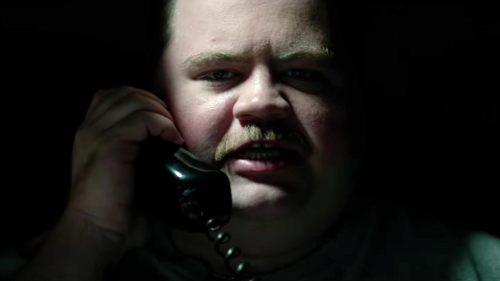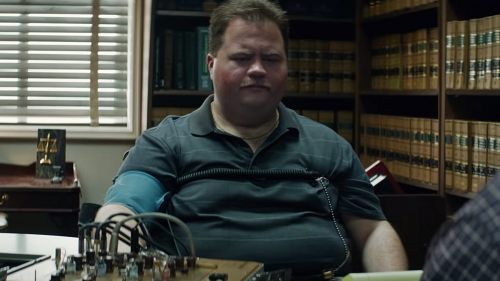THE MULE Review: Clint Eastwood’s Long Middle Finger
Clint Eastwood is certainly a man with a reputation, one that by this point may actually have overtaken his role as one of Hollywood’s most iconic leading men and late-career directorial auteurs. He’s a proud libertarian, perhaps most famous in political circles for speaking to an empty chair representing Barack Obama at the Republican National Convention, and this has bled heavily into his directorial career, where issues of race and class disparity are shown as artificial barriers to personal success. After all, if a straight white guy can do it, then why the hell can’t anyone else? Of course, Eastwood has received his fair share of criticisms over the years for perpetuating these views through his films, especially as social consciousness about economic and racial inequality has developed to largely undermine the core tenets of his libertarian beliefs. And this is where The Mule comes in, as Eastwood decides to say fuck it and revel in his own narcissism and delusions of absolute moral certitude.
Begrudgingly, The Mule is a biography of Earl Stone, a ninety-year-old white man who was caught and arrested for running drugs across the U.S. for a Mexican cartel, but in reality this is mostly an excuse for Eastwood to direct himself playing himself, or at least a somewhat idealized version of it. Earl is a working man after Eastwood’s own heart, so when the foreclosed-upon florist finds himself offered a job as a drug-runner, he takes the opportunity for the payday, societal consequence and personal risk be damned. Earl’s arc is built around how he has spent his life ignoring his family in favor of work and socializing, meaning that when he finally has to make a choice between his family or pissing off his drug lord bosses, there is a sense of dramatic tension that technically resolves a complete realization of a character flaw. However, to call that development the focus of the narrative would be laughably generous, as Earl/Clint has way too much fun carting around drugs, using his white privilege to get away with it, and reaping the financial and social benefits of doing so to consider the obligation of the third act anything approximating a coherent point.
The Mule isn’t critical of Earl for his self-serving choices, either. The film constantly goes out of its way to frame him as a fountain of sage wisdom for those he meets, particularly if they are minorities in need of his assistance and in complete condescension of any objections they may have to his behavior. He affectionately calls a group of lesbian bikers “dykes” without any repercussion. He stops to help a black couple with a flat tire, casually calls them “Negroes,” then is completely dismissive of their appropriately disturbed response to the word. He decries younger generations for their use of the internet, constantly shouting down people looking at phones from a smug sense of superiority to not being connected the largest source of knowledge in human history. The Hispanic men for whom he works give him begrudging respect, at first because he’s a doddering old man, but eventually because his experience outweighs his bigoted perceptions of them as an indistinguishable group – not that the film bothers to characterize them much more than “the nice ones” and “the mean ones.” Even the man who will eventually arrest him (Bradley Cooper) is in awe of the life advice Earl imparts to him. Earl, and Eastwood by extension, is a man largely defined by his unwavering belief that he is right in all things, respected if not liked by everyone, and more often than not is proven right in his convictions. And his reward for this transcendent ethos is money, esteem, and sex, and his only sins are ignoring a family that hates him and getting caught.
Hell, Earl doesn't even need to be present in the scene for Eastwood to push his narrow perception of the world. Traditionally feminine pursuits such as spa grooming are demonstrated as signs of weakness of character, lacing the film with an undercurrent of homophobia that punctuates with a prison rape joke. A person of color is pulled over by police, starts rambling about how this interaction is statistically the most dangerous moment of his life, and the police leave without shooting him as if that's supposed to mean something. Moments like these litter the film, and they serve no narrative purpose other than for Eastwood to rant at more empty chairs in the less-than-full theaters to which this will play.
In fact, there is probably no better indicator of how The Mule functions as a victory lap for Eastwood’s ego than in how it treats its female characters, or at least the women he has stand in as the facsimile of characters but only exist as reflections of his growth. Women in The Mule fall into one of two categories, the first of which are Earl’s family, who serve the utilitarian function of hating him until he earns a ton of money before letting go of that hatred because somehow having all that mysterious cash to donate to good causes makes him a good person again. They are only present to provide a benchmark for Earl’s artificial growth, but his ex-wife, daughter, and granddaughter cannot be said to be developed characters in their own right. The other category, though, has no named characters. These women are sex objects, shot in lascivious ways that particularly focus on their butts and serve the sole purpose of showing just how much Earl’s success is getting him laid. Eastwood shoots himself getting involved in not one, but two threesomes, neither of which is integral to the plot and only serves to show how great a time “Earl” is having in his exploits, using women as a transparent measure of his Big Dick Energy. I doth think Clint protest too much.
Strip away the façade of The Mule’s biopic trappings, and it’s pretty clear what Clint Eastwood’s latest film is: a giant middle finger projected across the largest screen possible. Eastwood wants to show the world that the measure of success is not in how you treat others, or in how you come by your earnings, or in the consequences of your actions, but in how much of a great time you can have even when it is willfully ignorant to the struggles of everyone who doesn’t look like you. Earl is framed as loveable for his casual racism and lack of sympathetic filter, yet he’s anything but, and The Mule is openly hostile to anyone who thinks otherwise. If you don’t think it’s right for Earl to be empathetic not in spite of, but because of his attitudinal bigotry, then Clint Eastwood would love to spend these two hours telling you to go fuck yourself.
Well fuck you too, Clint.



